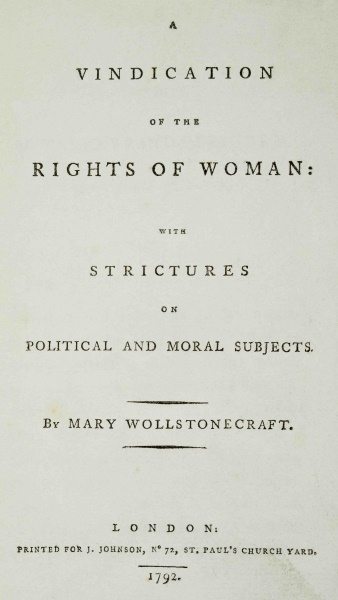Wollstonecraft: A Vindication of the Rights of Woman: With Strictures on Political and Moral Subjects
First published in England in 1792, Mary Wollstonecraft’s A Vindication of the Rights of Woman is a foundational text of Western feminism. An early supporter of the French Revolution, Wollstonecraft joined contemporaries such as Thomas Paine in protesting the inequalities of British society, calling for the elimination of hereditary rule and the creation of a new political order based on reason and equality. However, she went beyond most radicals by insisting that the subjugation of women was also an example of social corruption and tyranny that should be alleviated for the good of all.
In the late eighteenth century, women throughout Europe were marginalized by a combination of legal, social, and economic restrictions that rendered them generally dependent on men. English women lost their property rights and their legal personhood upon marriage, while single women had few career options if they needed to support themselves. Middle-class women like Wollstonecraft could find positions as governesses or schoolteachers, but these jobs paid poorly and were often seen as a last resort. Rather than enabling women to enter more prestigious professions, the more advanced forms of women’s education focused on teaching them “accomplishments,” such as French or music, to make them more attractive wives. In turn, even many revolutionary thinkers perceived women’s financial reliance on men as a reason to deny them a formal voice in politics.
In A Vindication of the Rights of Woman, Wollstonecraft describes her society as one in which the relationships between men and women have been perverted by a “false system of education” that encourages women to regard themselves as objects. Raised in accordance with the ideas of male philosophers like Rousseau, she contends, women learn to be superficial and sentimental. Instead of developing their reason, they focus on making themselves attractive to men and pursuing short-term pleasures. Furthermore, without reason, they cannot learn virtue. They become bad wives, bad mothers, and bad Christians.
Wollstonecraft argues that the solution to this problem is to educate men and women in the same fashion and hold them to the same moral standards. Like men, women should be taught to develop reason and study subjects such as history and politics in a deep and concentrated fashion. Both sexes should be encouraged to build up their strength with regular physical exercise. Furthermore, boys and girls should attend the same, nationally run schools and learn to interact with each other as rational beings. With more education, adult women could start their own businesses or take on professional work, particularly in the medical field. Women, like men, should even have representatives in government. With these changes, women would not only enjoy more well-rounded lives, but society as a whole would benefit from having stronger families and more virtuous citizens.
Although Wollstonecraft was already known for her fiction and political writings, A Vindication of the Rights of Woman helped establish her as one of the leading radical thinkers of her time period. However, her reputation suffered heavily after her death in 1797, when her husband William Godwin published his memoir about her life. Revealing that Wollstonecraft had borne a child out of wedlock with the American Gilbert Imlay years before, Godwin’s book scandalized much of the reading public and turned popular opinion against her and her works for years. Nevertheless, A Vindication of the Rights of Woman has continued to resonate with readers since its publication, inspiring such American feminist thinkers as Lucretia Mott and Susan B. Anthony and the early twentieth-century anarchist Emma Goldman.
—Mary Sanderson, PhD, Lecturer, History
Laura Sextro, a lecturer in history, discusses the political implications of Mary Wollstonecraft’s writing on eighteenth-century social thought. Interview is an online supplement to the University of Dayton exhibit Imprints and Impressions: Milestones in Human Progress—Highlights from the Rose Rare Book Collection, held Sept. 29 through Nov. 9, 2014.

